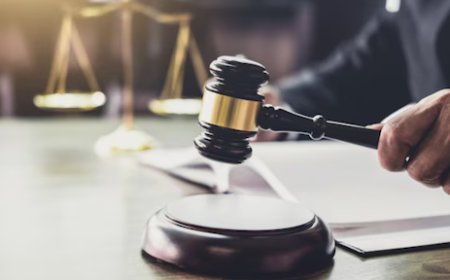How Criminal Lawyers in Dubai Deal with Bail and Detention Issues
Criminal lawyers in Dubai play a vital role from the moment detention begins. Their first objective is to ensure the legality of the arrest and whether due process is being followed.

Understanding the Legal Basis of Detention in Dubai
In Dubai, detention procedures are governed by the UAE Federal Law No. (35) of 1992 on the Criminal Procedural Law. Once an individual is arrested, they may be held in custody pending an investigation or until formal charges are filed. The legal framework permits the public prosecution to detain individuals for specific durations, subject to judicial review and extension.
Criminal lawyers in Dubai play a vital role from the moment detention begins. Their first objective is to ensure the legality of the arrest and whether due process is being followed. If procedural violations or unlawful detentions are discovered, the lawyer can petition for immediate release or the dismissal of charges.
Immediate Legal Intervention During Arrest and Initial Detention
The early hours following an arrest are critical. During this stage, the accused is often unaware of their rights or the consequences of their statements. Criminal defense lawyers in Dubai intervene immediately to:
-
Confirm the legal grounds of the arrest
-
Ensure the client is not coerced into confessions
-
Verify that detention conditions comply with the law
-
Advise clients on their right to remain silent and to legal representation
By being present early in the process, the lawyer can shape the defense strategy from the outset, minimizing legal risks and guiding the client through complex procedures.
Filing for Bail: Legal Grounds and Strategic Considerations
Bail in Dubai is not automatically granted and must be requested formally through the public prosecution or the competent court. Criminal lawyers in Dubai prepare detailed bail applications that address the courts concerns, including:
-
The seriousness of the charge
-
The risk of flight
-
The potential for tampering with evidence or influencing witnesses
-
The accuseds ties to the community, employment, and family
The application may include personal guarantees, financial securities, or passport surrender as conditions to secure bail. A well-drafted and timely bail request often makes the difference between release and continued detention.
Bail Hearings: Persuading the Court
At the bail hearing, criminal lawyers argue why their client does not pose a threat to the investigation or public safety. This involves:
-
Presenting evidence of permanent residence in the UAE
-
Demonstrating a lack of criminal history
-
Providing references from employers or community members
-
Offering financial guarantees or third-party sureties
The judge may grant bail conditionally, requiring regular reporting to the police station or travel restrictions. In serious crimes, such as drug trafficking or violent offenses, bail is less likely, and the defense must prepare a more substantial case to justify temporary release.
Handling Rejections and Reapplying for Bail
If bail is denied, the legal team can file an appeal or reapply with additional evidence. Criminal lawyers in Dubai often revise and strengthen the application by:
-
Introducing new circumstances or legal grounds
-
Presenting further guarantees
-
Addressing the concerns raised by the court in the initial rejection
This persistence is essential in ensuring that every legal avenue is explored to secure the clients freedom pending trial.
Ensuring Legal Rights During Detention
While the client remains in detention, their legal rights must be protected. Criminal lawyers routinely visit detention centers to:
-
Monitor the clients health and safety
-
Prevent mistreatment or unlawful coercion
-
Ensure timely access to family and consular representatives
-
Provide emotional support and legal updates
If any human rights violations are observed, lawyers can file formal complaints with the public prosecutor or higher judicial authorities to seek immediate redress.
Negotiating Conditional Releases
In certain cases, the prosecution may agree to conditional release, particularly when the charges are not yet finalized or when continued detention is unnecessary. Criminal lawyers negotiate with the prosecution to:
-
Secure release under surveillance
-
Convert detention into house arrest
-
Allow the accused to return to work under restrictions
These alternatives reduce the emotional and professional disruption caused by incarceration while maintaining cooperation with the legal process.
Prevention of Detention Through Early Legal Action
In some cases, individuals may be aware that a complaint or investigation is underway. Criminal lawyers can act preemptively by:
-
Contacting the authorities on the clients behalf
-
Offering cooperation with the investigation
-
Negotiating terms to avoid arrest
-
Submitting legal defenses before charges are filed
This proactive approach often prevents detention altogether, especially in commercial, cybercrime, and white-collar cases.
Appealing Detention Orders
If the public prosecution or court orders continued detention, criminal lawyers can appeal to a higher judicial authority. The appeal must be grounded in legal reasoning, citing:
-
Procedural violations
-
Lack of evidence
-
Medical or humanitarian concerns
-
Unnecessary delay in the investigation
By filing a structured and timely appeal, lawyers increase the chances of a favorable review and possible release.
Conclusion
Dealing with bail and detention issues in Dubai requires criminal lawyers in Dubai who are both knowledgeable and proactive. From the moment of arrest to securing bail or challenging unlawful detention, each step demands strategic planning, legal precision, and persistence. With the right legal representation, individuals facing detention in Dubai can protect their rights, secure temporary release, and build a solid defense.



































